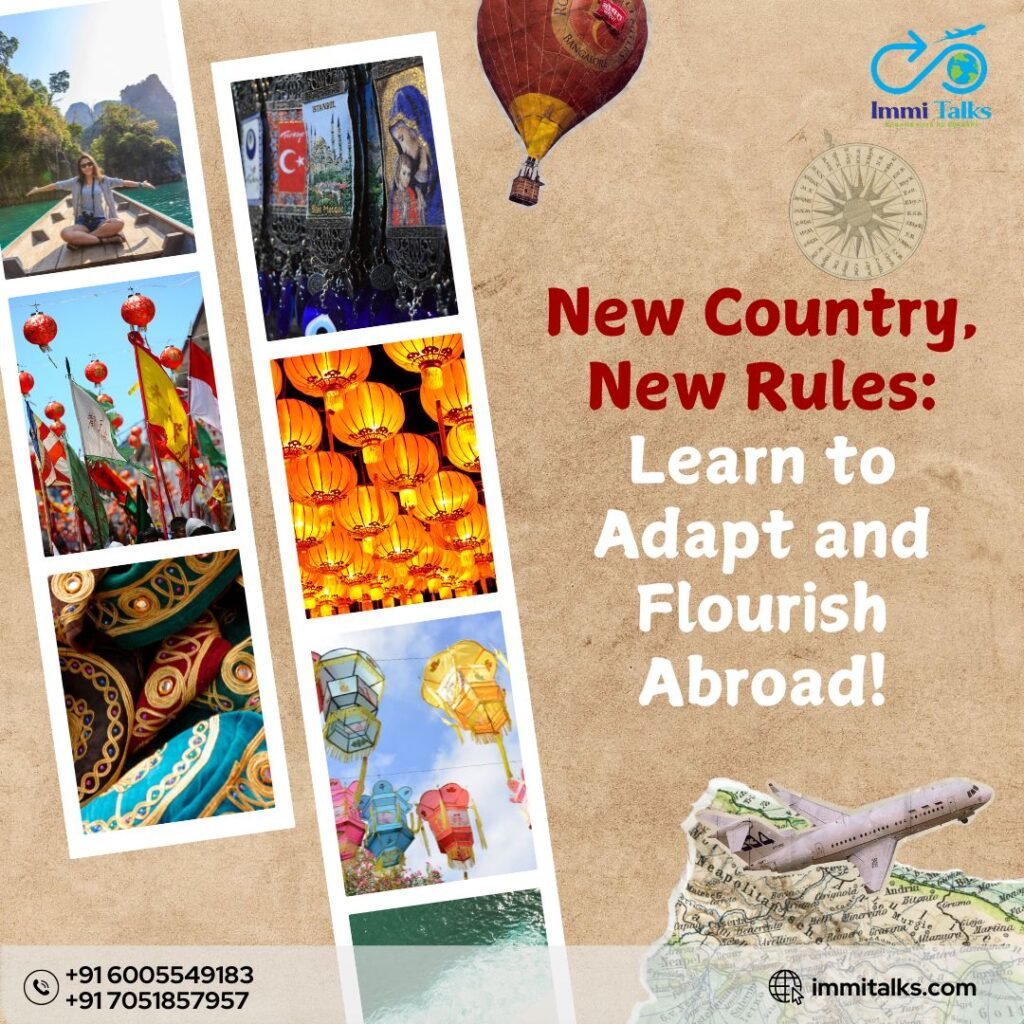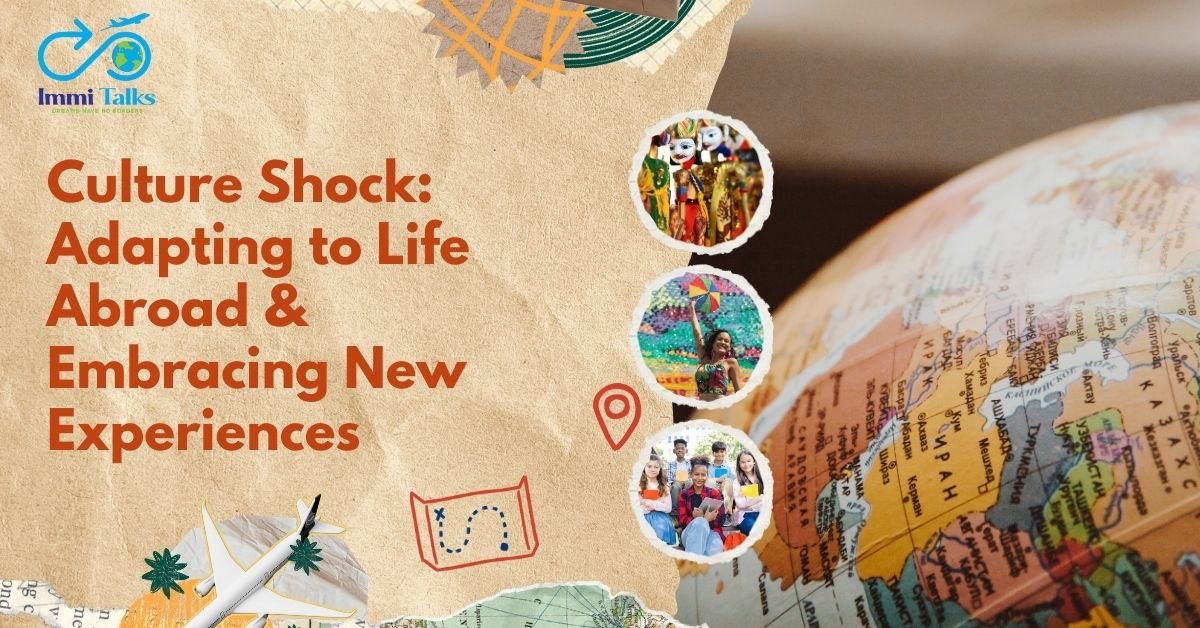Students preparing to attend a university in a foreign country always have something to look forward to – a chance for a new life in a new country; something that is called culture shock. Culture shock means that when a person is exposed to a different cultural behavior, signals, or attitude, he feels awkward. Adapting and acquiring culture shock may pose many challenges to many students because some behaviors and expressions in the new environment differ greatly from their home cultures. To make international experiences both rewarding and enjoyable, it’s essential to understand and unlearn these differences.
Understanding Cultural Differences: Gestures, Body Language and Habits
In every culture, people employ signs and motions, certain postures, and habits to communicate or to show respect. Nevertheless, these could differ greatly in different countries and what is proper or polite in one country may be considered impolite in another. For example:
- Gestures: Even the act of making eye contact could be appropriate in some cultures and completely impоrtune in others: whereas in some cultures, those who maintain eye contact are considered confident and paying intense attention to something or somebody, in other cultures, making direct eye contact might be considered aggressive or at least invasive.
- Body Language: How positions in space and bearing differ from culture to culture. Mundane practices like back slaps or bear hugs may be acceptable in one culture but uncomfortable or inappropriate in another.
- Habits: Basic things like tipping at restaurants can pose a major shock to students who hail from countries where tipping is unheard of. As with the cases of greetings, gestures used might differ and including handshakes, kisses on the cheek, or even bows, could result in some moments of embarrassment due to failure to comprehend expected etiquette.
Learning all the little things one did not know before going to a given country makes it easier to adapt to that culture.
Adapting to the Culture: Practical Ways to Learn and Integrate

The process of getting accustomed to the culture of multinationals entails embracing the culture of people from other countries. This knowledge helps students gain tolerance and become more self-confident while interacting with local people. Some practical ways to learn about different cultures include:
- Reading and Researching: Find relevant cultural information in books, articles, and other online resources.
- Watching Documentaries and Films: Media from other cultures offers a glimpse into daily life, culture, interactions, and business practices.
- Taking Language and Cultural Sensitivity Courses: Many universities and language schools offer programs to introduce students to cultural nuances, aiding their integration.
Making New Friends Abroad: One of the Most Significant Strategies
Reduce cultural impact by connecting with friends from different regions and open-minded locals. New friends make adapting easier and more fun by sharing experiences and explaining the culture. Here’s how students can approach friendship-building while abroad:
- Join Student Groups and Organizations: Most universities have international clubs, or language exchange programs that give students a chance to interact with fellow students from different nations.
- Attend Cultural Events and Festivals: Cultural events are the best way to meet new people and experience local culture.
- Be Open and Respectful: Curiosity about others’ customs fosters positive interactions and reciprocity.
Many international friendships provide comfort and helpful information concerning cultural differences. They also build cultural relations and foster a student’s inclination to embrace the value of diverse cultures.
The Role of Networking: Creating strong bond overseas
Networking is about building connections that support students’ learning and future goals. It includes meeting academic delegates, joining professional groups, and engaging with professors, leading to internships, jobs, and mentorship.
Some benefits of networking include:
- Gaining Insights from Industry Experts: This way students can learn about careers, trends, and practices in their target field from individuals already practicing in the trade.
- Building a Support System: Social platforms act as a safety net in a flow helping professionals in changing cultural and working contexts.
- Increasing Job Prospects: Employers value international experience, and networking helps students build relationships that can endorse their suitability for global roles.
How Immi Talks Can Help
Before pursuing an undergraduate or postgraduate course abroad, international students often face challenges like prejudice and cultural adaptation. But with Immi Talks, a study abroad consultancy in Jammu, this journey becomes easier and more rewarding.
Immi Talks provides invaluable resources and guidance to help students navigate cultural differences, academic demands, and social experiences abroad. Their Online Cafe is a virtual space where students can connect, share experiences, get advice, make friends, and build professional networks.
Immi Talks’ experienced trainers provide personalized support to prepare students to adapt and thrive in multinational environments. They guide students on how to confidently face challenges and make the most of their study abroad experience.






Les devices Garmin intègrent des technologies avancées au quotidien.
Avec écran AMOLED ainsi que de suivi du sommeil , ces montres répondent à tous besoins .
Leur autonomie atteint une longue durée selon le modèle, adaptée aux voyages .
Garmin Forerunner
Les fonctions santé permettent de le sommeil et aussi l’oxygène , aidant à optimal.
Intuitives pour utiliser , ces montres s’intègrent facilement dans votre vie, avec une interface ergonomique.
Découvrir ces modèles signifie bénéficier de des solutions éprouvée afin d’optimiser vos performances .
Dikkatli bahis yapmak, deneyiminizi korur .
Bahis limitlerinizi net tanımlamak , dengeli oynamaya olanak tanır.
Kendinizi yönetim araçlarını kullanmak, kontrolü sağlamınıza destek olur .
Alev Casino’da Gerçek Parayla Online Oynayın
Oyunların sorunlarının farkında olmak, sorunsuz deneyim mümkün kılar.
Erken aşamada profesyonel destek aramak, sorunları korumaya katkı sağlar .
Bu adımlar , eğlenceli dengeli bahis süreci deneyimi zenginleştirir .
Эффективные решения отслеживания рабочего времени способствуют улучшению производительности .
Автоматизация процессов минимизирует погрешности в планировании графиков.
Руководителям удобнее анализировать проектные задачи в режиме реального времени .
https://kyrie8.us/finance/methods-of-personnel-management-lie/
Персонал имеют удобный учёт при оформлении отпусков.
Переход на автоматизацию значительно ускоряет кадровые процессы с минимальными усилиями .
Это гарантирует доверие между отделами , сохраняя мотивацию сотрудников.
В мессенджере Telegram появилась новая функция — внутренние звёзды.
Они предназначены для вознаграждения каналов.
Пользователи может передавать звёзды каналам.
купить звезды телеграм дешево через бота
Звёзды переводятся в реальные деньги.
Это понятный способ оценить труд.
Оцените новшество уже сейчас.
В мессенджере Telegram появилась функция звезд.
Теперь люди могут помечать важные сообщения.
Это позволяет быстро возвращаться нужную информацию.
купить звезды тг бот
Функция полезна для работы.
С использованием звёзд легко сохранить ключевые заметки.
Такой инструмент бережёт время и делает общение эффективнее.
At this page you can find a lot of helpful information.
It is made to guide you with various topics.
You will find simple explanations and everyday examples.
The content is frequently updated to stay current.
https://techiwiki.info
It’s a great resource for research.
Every visitor can benefit from the materials here.
Begin checking out the site right away.
Crash games are digital games with a interactive experience.
They offer a increasing multiplier that players can track in real time.
The goal is to react before the counter crashes.
cs2 crash gambling
Such games are widespread for their easy rules and thrill.
They are often used to train decision making.
A lot of platforms host crash games with different designs and features.
You can explore these games now for a engaging experience.
Заказ автозапчастей онлайн становится всё более удобной среди автовладельцев.
Сайты автозапчастей дают широкий выбор деталей для самых разных моделей автомобилей.
Цены в интернет-площадках часто ниже, чем в обычных магазинах.
Покупатели могут сравнивать предложения разных поставщиков без лишних затрат времени.
Маркетплейс автозапчастей Exzap
Кроме того, удобная система доставки позволяет оформить заказ без задержек.
Комментарии других покупателей помогают выбрать качественные автозапчасти.
Многие сервисы дают гарантию на запчасти, что повышает уверенность покупателей.
Таким образом, заказ в сети автозапчастей экономит время и деньги.
This online resource contains a wealth of useful insights about both men’s and women’s private life.
Visitors can discover diverse subjects that support them understand their connections.
Posts on the site cover healthy communication between couples.
You will also find advice on building shared respect.
Information here is written by professionals in the field of relationships.
https://findradio.us/love/fisting-in-adult-content-extreme-practice-or-subculture/
Many of the articles are clear and practical and beneficial for daily life.
Readers can use this knowledge to improve their relationships.
In short, this site offers a rich collection of reliable information about intimate topics for all adults.
Balanced engagement in online gaming means making thoughtful choices while enjoying interactive entertainment.
It promotes healthy practices and helps players create clear boundaries.
Practices of responsible play cover monitoring time and energy in a sensible way.
Players are advised to remain conscious of their actions and ensure a positive approach.
https://icosahom2020.org
Educational materials about responsible gaming help people to recognize their own habits.
Many services provide tools and features for tracking and individual support.
Practising responsible play allows everyone to get the most from i-gaming responsibly.
In short, mindful i-gaming is about self-control and following choices that protect your well-being.
Выбор профессиональной техники — серьёзный процесс в развитии салона.
Сначала стоит уточнить задачи и процедуры, которые хотите предоставлять.
Важно проверить сертификаты и производителя выбранного оборудования.
Комментарии прошлых пользователей помогут сформировать обоснованный выбор.
Бьюти Инструмент
Также следует обратить внимание на набор функций и простоту использования.
Первая оценка оборудования даёт понять эффективность работы.
Важно оценить стоимость и сервисное обслуживание.
Взвешенный выбор техники поможет повысить уровень услуг.
Подбор профессиональной техники — важный этап в развитии красоты.
Прежде всего стоит понять задачи и направления, которые вы планируете предоставлять.
Полезно оценить сертификаты и надёжность выбранного инструмента.
Комментарии других специалистов помогут принять уверенный выбор.
аппарат для SMAS-лифтинга цена
Также следует учитывать набор функций и эргономику работы.
Первая проверка оборудования даёт понять эффективность работы.
Стоит также оценить цены и поддержку производителя.
Взвешенный выбор аппарата поможет улучшить репутацию салона.
Современное медицинское оборудование играет ключевую роль в лечении и поддержке пациентов.
Медицинские центры всё чаще оснащаются высокотехнологичную технику.
Это позволяет врачам ставить точные оценки.
Новые приборы создают надёжность и для больных, и для врачей.
https://forum.motoshkola.od.ua/threads/kakie-imenno-chastnye-kliniki-vy-sovetuete-v-stolice.65511/
Развитие высоких технологий способствует эффективное оздоровление.
Часто устройства содержат функции для детального контроля состояния здоровья.
Доктора могут своевременно принимать решения, основываясь на данных аппаратуры.
Таким образом, современное техническое оснащение повышает эффективность медицины.
awesome
Creative photography often focuses on revealing the harmony of the natural shape.
It is about light rather than appearance.
Experienced photographers use subtle contrasts to reflect mood.
Such images capture authenticity and character.
https://xnudes.ai/
Every frame aims to evoke feelings through pose.
The goal is to show natural harmony in an respectful way.
Audiences often value such work for its creativity.
This style of photography combines technique and sensitivity into something truly timeless.
Нейросетевые боты для мониторинга источников становятся всё более востребованными.
Они дают возможность изучать публичные данные из разных источников.
Такие решения применяются для журналистики.
Они способны оперативно анализировать большие объёмы данных.
глаз бота
Это помогает сформировать более объективную картину событий.
Некоторые системы также обладают функции визуализации.
Такие сервисы активно применяются среди специалистов.
Совершенствование технологий делает поиск информации доступным и удобным.
Современные онлайн-сервисы для поиска информации становятся всё более востребованными.
Они дают возможность изучать доступные данные из интернета.
Такие решения используются для исследований.
Они могут оперативно анализировать большие объёмы информации.
гоаз бона
Это способствует получить более полную картину событий.
Некоторые системы также предлагают функции визуализации.
Такие сервисы активно применяются среди специалистов.
Совершенствование технологий позволяет сделать поиск информации более точным и наглядным.
Интеллектуальные поисковые системы для анализа данных становятся всё более популярными.
Они позволяют собирать публичные данные из интернета.
Такие решения применяются для исследований.
Они способны оперативно обрабатывать большие объёмы информации.
глаз бога бесплатно онлайн просмотр
Это помогает сформировать более объективную картину событий.
Отдельные системы также предлагают удобные отчёты.
Такие сервисы широко используются среди исследователей.
Эволюция технологий делает поиск информации более точным и быстрым.
Дизельное топливо — это основной компонент энергетики, который активно применяется в сельском хозяйстве.
Благодаря своей плотности энергии дизельное топливо позволяет достичь надёжную эксплуатацию двигателей.
Надёжное топливо обеспечивает долговечность работы двигателя.
Существенное влияние имеет состав топлива, ведь загрязнения могут ускорить износ.
Компании, занимающиеся реализацией дизельного топлива должны выполнять нормы безопасности.
Инновационные подходы позволяют улучшать его характеристики.
Во время покупки дизельного топлива важно проверять сертификаты качества.
Складирование и перевозка топлива также влияют на его стабильность.
Некачественное топливо может вызвать увеличению расхода.
Поэтому сотрудничество с надёжными компаниями — гарантия стабильности.
Сегодня представлено множество вариантов дизельного топлива, отличающихся по назначению.
Зимние марки дизельного топлива обеспечивают возможность функционирование оборудования даже при морозах.
С появлением новых технологий качество топлива постоянно растёт.
Грамотный выбор в вопросе использования дизельного топлива помогают стабильную работу техники.
Таким образом, правильно подобранное ДТ является основой долговечной эксплуатации любого транспортного средства.
Online services for mature people make it easier for individuals to find new acquaintances.
They are developed for those who seek open communication.
Modern dating sites offer a comfortable space for communicating with others in a virtual format.
A lot of people prefer online dating to save time.
FapWiki
The purpose of such platforms is to help people who share similar interests.
Responsible use on these platforms helps create genuine connections.
Modern technology make dating easier than ever before.
Ultimately, online platforms for adults make relationships possible regardless of location.
The site contains a lot of captivating and informative information.
Here, you can learn about various materials that expand knowledge.
Visitors will enjoy the information shared on this site.
Every category is well-structured, making it comfortable to use.
The content are relevant and engaging.
It’s possible to find tips on different subjects.
If you want to find inspiration, this site has what you’re looking for.
All in all, this site is a great source for curious minds.
https://orgza.info/
https://cdu-malsch.de/
The site provides a lot of fascinating and valuable information.
On the website, you can learn about a wide range of subjects that broaden your horizons.
Readers will appreciate the materials shared through this platform.
Each section is well-structured, making it comfortable to use.
The posts are presented professionally.
It’s possible to find information on various fields.
No matter if you seek useful facts, this site has everything you need.
All in all, this resource is a valuable hub for those who love learning.
https://xevanio.de/
https://rublevo.info/
This website contains a lot of fascinating and helpful information.
On this platform, you can learn about many topics that help you learn new things.
Readers will enjoy the resources shared here.
Each section is easy to navigate, making it pleasant to use.
The articles are written clearly.
The site includes recommendations on many areas.
Whether you’re looking for useful facts, this site has a lot to offer.
Overall, this website is a excellent platform for curious minds.
https://pro-nrn.de/
This website features a lot of interesting and helpful information.
Here, you can explore many topics that broaden your horizons.
Everyone will benefit from the materials shared on this site.
Every page is organized clearly, making it comfortable to use.
The content are easy to understand.
You can find information on different subjects.
No matter if you seek useful facts, this site has what you’re looking for.
Overall, this site is a excellent platform for people who enjoy discovering new things.
https://companysites.info/
This website offers a lot of engaging and informative information.
On this platform, you can explore various materials that expand knowledge.
Readers will value the information shared here.
All topics is well-structured, making it pleasant to use.
The content are relevant and engaging.
The site includes guides on numerous themes.
No matter if you seek inspiration, this site has a lot to offer.
In general, this platform is a great source for information seekers.
https://technikcentral.de/
The site offers a lot of engaging and valuable information.
On this platform, you can discover different articles that broaden your horizons.
Visitors will value the information shared through this platform.
Each section is thoughtfully designed, making it simple to use.
The content are relevant and engaging.
You can find tips on different subjects.
Whether you’re looking for useful facts, this site has a lot to offer.
Overall, this resource is a excellent platform for those who love learning.
https://casinopanatetsverige.com/
На этом сайте представлено много ценной информации.
Пользователи отмечают, что ресурс помогает быстро находить нужные сведения.
Материалы обновляются регулярно, что делает сайт надёжным для изучения.
Многие считают, что структура сайта очень понятна и позволяет сэкономить время.
Широкий выбор материалов делает ресурс универсальным для разных категорий пользователей.
Также отмечается, что материалы оформлены аккуратно и легко воспринимаются.
Сайт помогает расширять знания благодаря информативным материалам.
В итоге, этот ресурс можно назвать удобным местом для изучения важных тем для каждого посетителя.
https://icolog.ru